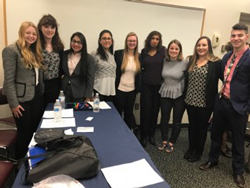The New Jersey Department of Education (NJDE) has proposed additional training and requirements for student teachers and higher standards for substitutes through revisions to in-state policies that were disclosed last month.
According to an article in the Asbury Park Press published on Feb. 16, the proposal would double the student teaching requirements for students in an education program at a college or university. Students would be obligated to extend the current one semester student teaching requirement to an entire year. In addition, they would need to teach in two different school settings and spend some of that time with special education students.
Students in alternative-route programs that are available in New Jersey would be required to remain in that same program from start to finish. Currently, students are allowed to transfer. These are not the first changes in recent months established by the NJDE. In June, they increased the GPA requirements for education programs from 2.75 to 3.00.
“We need to make sure the next generation, the next 150,000 teachers in New Jersey are prepared,” said Assistant Education Commissioner Peter Shulman after presenting the proposed changes. “By simply thinking about preparing them in a similar manner that we have prepared them before, I don’t think we are advancing the conversation.”
Requirements would also span to out-of-state-teachers. Such teachers are accepted into the state under “porous rules.” To receive a permanent license teacher would need to show proof of effective teaching in their state for two out of three years to receive a permanent license in New Jersey.
Maham Ayub, a senior double major in English and Elementary Education, sees where Shulman is coming from. “I do agree with what the Department of Higher Education proposes about student teaching requirements as well as doing fieldwork in different school environments and working with special education children. Even though it is going to require more time, it is better to be prepared and learn now,” she said.
According to the NJDE, these revisions would be taking a holistic approach; it would “…develop and retain effective teachers,” wrote Shulman in a recent memo. This particular approach considers the entire lifecycle of an educator. The revisions are meant to attract, develop, and retain exceptional teachers.
The state consulted with the New Jersey Education Association (NJEA), the state’s largest teachers union, as it developed the proposal. NJEA President Wendell Steinhauer said that the two sides do not completely agree on everything in the proposal, specifically in regards to substitution.
Northjersey.com stated that the NJEA does not approve of subjecting substitute teachers with stricter requirements. Currently, substitutes must have 60 college credits or an associate’s degree to work in a classroom. However, the new policies would require substitutes to have a bachelor’s degree. Also, the number of consecutive days a substitute can be in a classroom would be lowered.
This new approach wouldn’t affect current substitutes but might be required of new candidates. The NJEA is concerned that there might be a potential shortage in substitute teachers from these revisions and said it was something that has to be further deliberated.
Ayub said, “I find it unfair for the Department of Higher Education to enforce that substitutes must have a bachelor’s degree. This is because not all substitutes are going to be future teachers. Being a substitute could simply be a way to make extra money. Substitute teaching is not only limited to education majors.”
According to Educationnews.org, Education officials are interested in starting a database that will track the performance of students, the placement of teachers, and how students do in the workforce. These measures would help state officials successfully evaluate the strengths and weaknesses of teacher education programs provided at institutions of higher education.
“As we implement better and more rigorous standards, assessments, and educator evaluations across New Jersey, we must ensure that we prepare novice teachers to meet these demands and effectively serve students from day one. We can leverage preparation and certification requirements to ensure strong candidates enter preparation programs, receive quality instruction, and demonstrate appropriate performance as novice teachers,” wrote Shulman in the memo.
Nonetheless, grade point averages, standardized tests, and curriculums are not the only aspects that must be considered when finding qualified individuals to teach future generations. “A good teacher is someone with a willing soul, a prepared mind, a firm goal, open heart, and an understanding of what it means to be human,” said David Tietge, an associate professor of English.
PHOTO TAKEN from milikeneducatorawards.org



